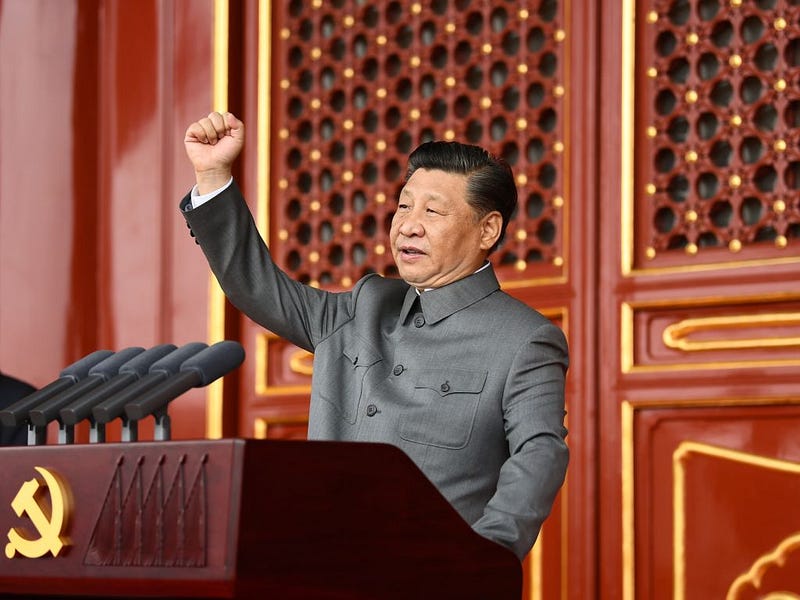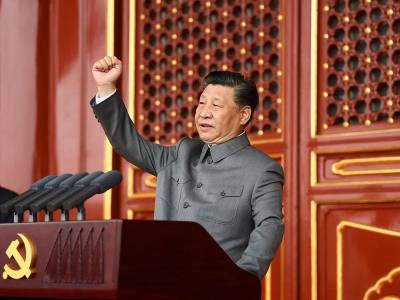On July 1, Xi Jinping delivered a speech commemorating the centenary of the Chinese Communist Party (CCP). For longtime Xi watchers, his address contained little, if anything, that was new. Still, the speech, which was transcribed into English and released on state-controlled media websites, provides a useful window into how Xi continues to see his party 100 years after its founding. With that framework in mind, here are some observations.
To be sure, Xi relied on standard CCP motifs. He preached the greatness of China’s ancient civilization and obsessed over the need for “national rejuvenation”—the main justification the CCP offers for its own existence. Xi repeated all of the historical grievances that the CCP has used as a pretext for its absolute power. “After the Opium War of 1840…China was gradually reduced to a semi-colonial, semi-feudal society and suffered greater ravages than ever before,” Xi lamented. This led to the country enduring decades of “intense humiliation,” in which the people “were subjected to great pain, and the Chinese civilization was plunged into darkness.” Since then, Xi said, “national rejuvenation has been the greatest dream of the Chinese people and the Chinese nation.” It’s a “dream” Xi says he and the CCP are making a reality.
But it is striking how much of Xi’s rhetoric is a mishmash of different concepts, some of which are directly at odds with one another. Careful readers will note ideological fault lines throughout Xi’s explanation of the CCP’s role.
Consider that Xi used the word “democratic,” in one form or another, at least several times to describe the party. He claims that the CCP achieved “great success” in the “new democratic revolution” of the 20th century. “The victory of the new-democratic revolution put an end to China’s history as a semi-colonial, semi-feudal society, to the state of total disunity that existed in old China, and to all the unequal treaties imposed on our country by foreign powers and all the privileges that imperialist powers enjoyed in China,” Xi claimed.
Incredibly, Xi said the CCP is still democratic to this day, explaining that one of the party’s goals is to “enhance” its “capacity to conduct sound, democratic, and law-based governance.” The Chinese leader even claimed the party will “develop” what he calle a ”whole-process people’s democracy” that “safeguard[s] social fairness and justice.”
This rhetorical framing should stand out to anyone with a passing familiarity of the CCP and Xi’s increasing power within it. The CCP has never been “democratic.” Today, according to Xi, it has a staggering 95 million members. But that is still less than 7 percent of China’s 1.4 billion citizens. The CCP has always been authoritarian—none of its power is drawn from anything resembling a true democracy. But as many have noted, Xi has consolidated his grip on power over the past decade, meaning that the party has become increasingly autocratic.
Some of the CCP members in Xi’s audience know the party’s inside baseball better than anyone, and certainly better than any outside observers, as they’ve witnessed Xi’s power grab firsthand. So, I would like to imagine that some of them privately demurred when Xi said: “The party has no special interests of its own—it has never represented any individual interest group, power group, or privileged stratum.” That isn’t true, as demonstrated by Xi’s own career.
This obvious tension is only exacerbated by Xi’s call for increased obedience. He said that his nation “must uphold the core position of the general secretary on the Party Central Committee and in the party as a whole, and uphold the Central Committee’s authority and its centralized, unified leadership.” The former position—that of general secretary—is Xi’s own. And like all good autocrats, Xi wants to ensure that the armed forces remain unwaveringly loyal to him and the CCP’s centralized leadership. “We will take comprehensive measures to enhance the political loyalty of the armed forces,” Xi said.
All of which is to say that Xi’s repeated references to “democracy” are somewhat bizarre. His definition of “democratic” is either vastly different from ours, or he employs the concept as a defensive shield against critics who correctly point out that the CCP is anything but pro-democracy.
There is some discussion in Washington concerning whether the CCP is truly Marxist. The issue is that modern China is not organized like the anti-democratic Marxist regimes of the 20th century, with their centrally managed economies. Beijing operates a hybrid system of sorts—“socialism with Chinese characteristics”—with the party maintaining total political power, while allowing for some degree of economic competition to spur innovation and growth. The CCP still has ultimate control of the economy and is heavily involved in overseeing key industries and companies, but Beijing realized long ago that it was self-defeating to attempt to micromanage every last business transaction.
For his part, Xi openly embraced the Marxist label—which, again, is at odds with the notion that the CCP is democratic. “Marxism is the fundamental guiding ideology upon which our Party and country are founded; it is the very soul of our Party and the banner under which it strives,” Xi said. “The Communist Party of China upholds the basic tenets of Marxism and the principle of seeking truth from facts.”
But at another point in his speech, Xi hints at the adjustments the CCP made to its Marxist doctrine—modifications that became all the more necessary after the Soviet system fell. He says that a “hallmark” distinguishing the CCP “from other political parties is its courage in undertaking self-reform,” as this allowed the party to remain “so vital and vibrant despite having undergone so many trials and tribulations.” The autocratic regime’s ability to continue adjusting will be tested in the future, when economic and demographic challenges arise, including an aging population. In that vein, Xi reminds his audience that even as the party “fought to establish and consolidate our leadership over the country, we have in fact been fighting to earn and keep the people’s support.”
Even in an autocracy, therefore, some level of popular support is necessary to avoid potential political turmoil. So far, however, the CCP has survived all democratic and other political challenges to its authority.
Xi had little to say with respect to foreign affairs. He made no direct mention of the U.S. Xi painted China as a victim of outside aggressors, claiming that Beijing only wants what is best for the world. “Peace, concord, and harmony are ideas the Chinese nation has pursued and carried forward for more than 5,000 years,” Xi said. “The Chinese nation does not carry aggressive or hegemonic traits in its genes.”
Of course, the U.S. and its allies are rightfully concerned that now—after China’s “national rejuvenation” has taken many steps forward—the CCP will seek to expand its power beyond its borders.
However, Xi did not saber rattle, even with respect to hot button issues such as Hong Kong and Taiwan. Concerning the former, he claimed that Beijing will continue to respect the principle of “one country, two systems” and that the CCP’s moves are merely intended to “safeguard national security.” Many Hong Kongers would beg to differ, as the CCP’s actions are undoubtedly aimed at ending the degree of autonomy they previously enjoyed.
And on Taiwan, Xi said that the party would continue to seek “peaceful national reunification.” Still, “complete reunification is a historic mission” requiring “an unshakable commitment.” Time will tell how committed Beijing really is to peace.






Please note that we at The Dispatch hold ourselves, our work, and our commenters to a higher standard than other places on the internet. We welcome comments that foster genuine debate or discussion—including comments critical of us or our work—but responses that include ad hominem attacks on fellow Dispatch members or are intended to stoke fear and anger may be moderated.
With your membership, you only have the ability to comment on The Morning Dispatch articles. Consider upgrading to join the conversation everywhere.